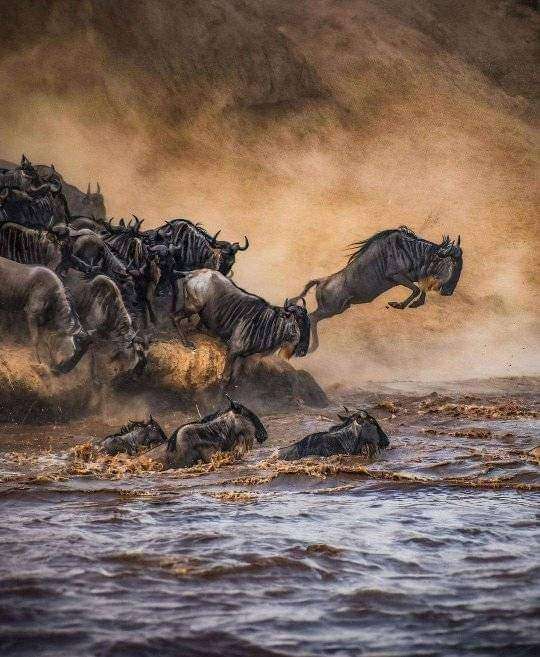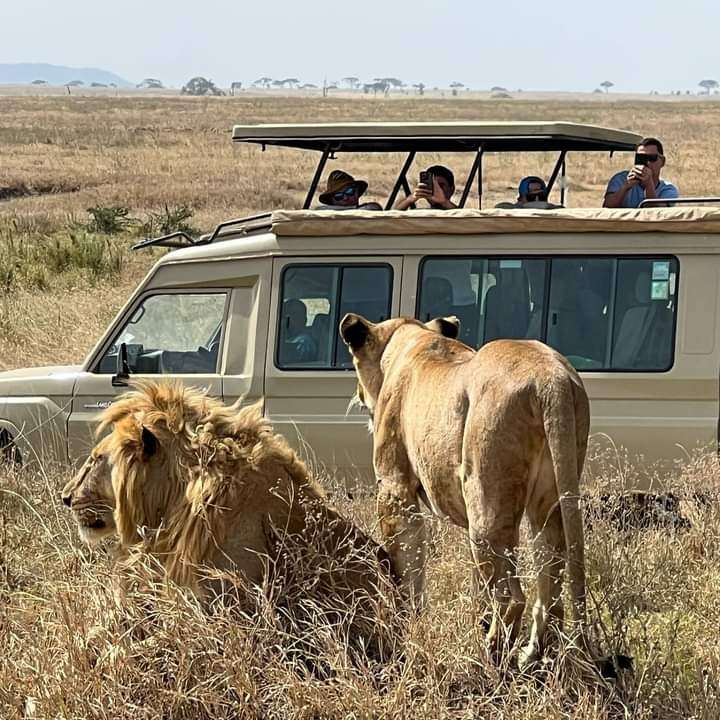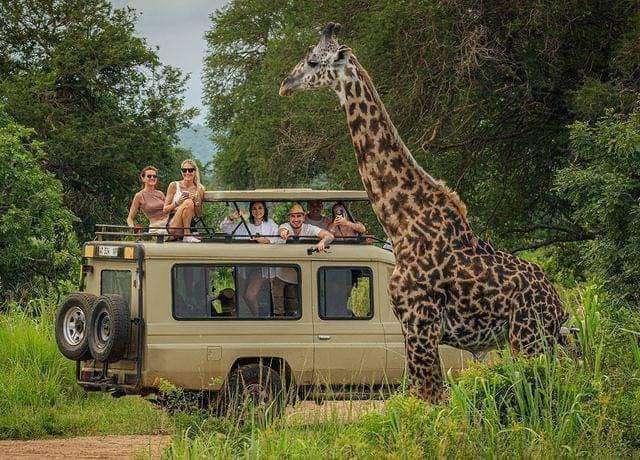
Sorry, we don't have any places yet
You may also be interested:

Removed from Unnamed collection
Douala-Edea Wildlife Reserve 
Covering 400,000 acres as at year 2000, the Douala-Edéa Wildlife Reserve boasts an 80% tropical lowland equatorial forests and 15% Atlantic mangrove, including Lake Tissongo. Established in 1932, the reserve was designated a wildlife park in 1971. http://afrotourism.com/attraction/douala-edea-wildlife-reserve/
Map

Removed from Unnamed collection
Terra Kulture 
There is only one institution that can pride itself as Nigeria’s Cultural Centre. And that’s none other than the inimitable Terra Kulture – the arts, entertainment and educational hub that has been at the fore-front of redefining Nigeria’s cultural landscape over the last decade. http://afrotourism.com/attraction/terra-kulture/
Map

Removed from Unnamed collection
TINUBU SQUARE 
Madam Tinubu, the Nigerian businesswoman and patriot, after whom the prominent Lagos landmark, “Tinubu Square,” is named lived in the area in the 19th century and was born in Abeokuta, Ogun State, Western Nigeria, to a trading family. Tinubu square is by Broad street, CMS, Marina – and the Brazilian quarters in Lagos Island . https://afrotourism.com/attraction/tinubu-square/
Map

Removed from Unnamed collection
Old Colonial Houses 
These houses were built in Brazillian and British architecture and are mainly in Ebute-Metta, Yaba and Lagos Island. http://afrotourism.com/attraction/old-colonial-houses/
Map

Removed from Unnamed collection
Osu Castle 
Osu Castle, formerly known as Christiansburg, was built in 1659 and named after King Christian V of Denmark. Throughout its history, the Castle changed hands among foreign competitors several times until the early 1920s. http://www.ghana.travel/places-to-visit/regions/greater-accra/
Map

Removed from Unnamed collection
Kwame Nkrumah Mausoleum 
This magnificent monument on High Street was erected in honour of Ghana’s first President, Osagyefo Dr. Kwame Nkrumah, a great Pan-Africanist who led the country to Independence in 1957. T http://www.ghana.travel/places-to-visit/regions/greater-accra/
Map

Removed from Unnamed collection
Ghana National Museum 
It was officially opened by the Duchess of Kent during the Independence celebration in March, 1957. Located on Barnes Road, close to the Accra Psychiatric Hospital, the National Museum is the repository of the country’s historical and cultural treasures, as well as artifacts from other ancient African Empires.
The collections range from prehistoric, archaeological discoveries to colonial antiquities and exhibits of contemporary African Art. http://www.ghana.travel/places-to-visit/regions/greater-accra/
Map

Removed from Unnamed collection
They nice places you can visit to have a good experience. We can take you there safe and give you a great tour . 
21 September 2024
Here are some of our tour activities we give to our guests.
Map

Removed from Unnamed collection
Musee Municipal d'Art Contemporai 
The museum is an initiative of the city council of Cocody, which was started in November 1993. Featuring a permanent exhibition of modern and contemporary works by Ivorian and other African artistes, the museum’s collection has over 150 paintings, 40 sculptural pieces, 15 ceramics, 11 tapestries and 216 books. http://afrotourism.com/attraction/musee-municipal-dart-contemporai/
Map

Removed from Unnamed collection
Musee National 
A decent little museum located centrally in the Le Plateau region, with a special focus on Ivorian art. Exhibits include; beautiful human and animal statuettes made of terracotta, jewelry, pottery, indigenous musical instruments, wooden masks and other carvings from all parts of the country. http://afrotourism.com/attraction/musee-national/
Map

Removed from Unnamed collection
Parc du Banco 
This National Forest Reserve on the outskirts of the city covers an area of 7,500 acres of tropical rainforest. While wildlife is rather hard to spot, there are walking trails, a lake, an arboretum and a great picnic area. http://afrotourism.com/attraction/parc-du-banco/
Map

Removed from Unnamed collection
Saint Michael's Fortress 
Designated a UNESCO World Heritage Site in 1996, Säo Miguel fort was built in 1576 by Paulo Dias de Novais who founded the city of Luanda. In 1627, the fort became the administrative colony and was a major outlet for slave traffic to Brazil.
With thick walls fitted with cannons, it was a fortified enclosure, and it remained the headquarters of the Commander-in-Chief of the Portuguese Army in Angola until 1975.
The fort presently houses the National Museum of Military History. http://afrotourism.com/attraction/fortaleza-de-sao-miguel-saint-michaels-fortress/
Map

Removed from Unnamed collection
Museu Nacional de Antropologia 
Dedicated to educating people about the history and culture of Angola, the National Museum of Anthropology has a collection of over 6,000 objects and artefacts, ranging from arts, masks, musical instruments, tools, fabrics, jewelry and weaponry. There are also cultural exhibits on traditional religion, female societal rites, and other traditional ceremonies. http://afrotourism.com/attraction/museu-nacional-de-antropologia-national-museum-of-anthropology/
Map

Removed from Unnamed collection
Miradouro da Lua 
Located about 40km south of Luanda, the Moon Viewpoint is a spectacular landscape, shaped by years of rains and erosion, which in turn makes it look similar to the surface of the moon http://afrotourism.com/attraction/miradouro-da-lua-moon-viewpoint/
Map

Removed from Unnamed collection
Fortress of Ghat 
Ghat is a Tuareg oasis, located in southern Libya, very close to the Algerian border, at the base of the enigmatic Tadrart Acacus. Like many other desert settlements, the old village is connected via narrow streets, archways and passageways, very reminiscent of those of Ghadames, where Tuareg blacksmiths display their unique silver jewellery, and traders offer their leather products and indigo coloured fabrics https://www.temehu.com/Cities_sites/Ghat.htm
Map

Removed from Unnamed collection
Bunce Island 
Located in the Sierra Leone River, a few miles north of Freetown, Bunce Island was home to one of the most lucrative slave trading operations in West Africa. Between the late sixteenth century and 1807, when it was outlawed by the British government, hundreds of thousands of West Africans became victims of the slave trade. From Bunce Island, the furthest point upriver that was accessible to commercial ships, slaves were sold to colonies in the West Indies and North America. The rice-growing skills of Africans from the west coast commanded high prices from rice plantation owners in North America. In recent years, studies have revealed clear connections between the linguistic traits and cultural traditions of the Gullah people in the U.S. states of Georgia and South Carolina and the people of Sierra Leone.
As was also the case at other sites in West Africa, European companies erected a fortified trading post with ancillary buildings, referred to as a slave castle, on the uninhabited Bunce Island. The structures that remain, including bastions, walls of the merchants’ quarters, the gunpowder magazine, and the gate to the slave house, were constructed of local stones and imported brick. Although the isolation of the island has helped prevent much human destruction, the severe local climate has resulted in ongoing degradation from the elements. Uncontrolled growth of vegetation in and around the ruins and coastal erosion threaten the preservation of the site. Additionally, conflict and a weak economy that is still recovering from the effects of the 2014 Ebola epidemic have hampered many plans for the preservation of Bunce Island. https://www.wmf.org/project/bunce-island
Map

Removed from Unnamed collection
Tacugama Chimpanzee Sanctuary 
Tacugama Chimpanzee Sanctuary situated outside of picturesque Regent Village is only 30 minutes from Freetown. Located along the Regent/Bathurst mountain road, this sanctuary for orphaned and habituated chimpanzees is a refuge for human visitors as well. Offering daily scheduled visits, as well as 6 eco-huts for overnight stays, Tacugama is the perfect place for those wishing to escape the heat and hustle of Freetown and enjoy fragrant forest breezes in the company of some extraordinary creatures. The Sanctuary now offers self-catering accommodation in the form of 6 beautifully crafted lodges.
Established to rescue orphaned and captured chimps, the facilities expanded to encompass two large reserves. Tacugama has been featured in various wildlife programmes and magazines. A rescued albino chimp at the sanctuary also helped to bring it to international attention. Sadly, the albino chimp is no longer alive but the sanctuary continues to grow from strength to strength.
These endangered animals share 98.6 per cent of their DNA with humans and their complex social behaviours and human-like tendencies are fascinating to behold. The story behind Tacugama is just as riveting. Established in 1995, this sanctuary, which covers 100 acres of rain-forest and watershed, is home to 90 chimpanzees that have been victimized by the illegal hunting, capturing, and selling of their species. During the conflict, Tacugama staff smuggled food to the chimpanzees and pleaded with the rebels to spare their lives. Don’t miss the extraordinary experience of viewing these intelligent beings up-close in their natural habitat. https://www.visitsierraleone.org/tacugama-chimpanzee-sanctuary/
Map

Removed from Unnamed collection
National Railway Museum 
It is interesting to tour around the restored engines and cars of the amazing National Railway Museum. You don’t have to be a rail lover to catch the fun of Clinetown museums, where there is a great collection of restored locomotives, including one for the Queen of England in year 1961. http://afrotourism.com/attraction/national-railway-museum/
Map

Removed from Unnamed collection
Khalifa House Museum 
The museum is located near The Mahdi’s tomb in Omdurman. The house was built for the successor of the Mahdi. The museum was established in 1928 and contains antiquities of the Mahdist period. https://afrotourism.com/attraction/khalifa-house-museum/
Map

Removed from Unnamed collection
Sudan National Museum 
Sudanese Museum is one of the main attractions of Sudan. The National Museum of Sudan is the largest museum in Sudan. Located on El Neel Avenue in Khartoum, the museum contains works from different epochs of Sudanese history. http://sudannationalmuseum.com/
Map

Removed from Unnamed collection
Leptis Magna 
Leptis Magna is an archaeological site in the northern part of Libya. It is located in the Al Khums region, with the Mediterranean coast on one side and the Sahara Desert on the other. Owing to its location near the Mediterranean Sea the area has a more temperate climate than the interiors of the country. The impact of the desert keeps the climate dry with very hot summers and pleasant winters, rainfall is minimal. http://www.libyan-tourism.org/tourist-attractions-of-libya/
Map

Removed from Unnamed collection
The Old City (Medina) 
The Old City (or Old Medina), with its labyrinthine dark lanes, is an exotic place to see, bustling with life and shoppers and oozing with rich aromas of spices, coffee, nuts, falafel and freshly-made sweets. https://www.temehu.com/Cities_sites/Tripoli.htm
Map

Removed from Unnamed collection
The Red Castle or Assaraya Alhamra 
The castle was the seat of power in Tripolitania ever since the Turkish Pashas used it as their official headquarters in the 16th century, and remained so until recently when things began to change after the colonial wars at the start of the 20th century. https://www.temehu.com/Cities_sites/Tripoli.htm
Map

Removed from Unnamed collection
The Karamanli (Qaramanli) House 
The House of Karamanli, or al-Qaramanli House, was built in the second half of the 18th century, during the reign of Ali Pasha Alqaramanli, and was used by Yousuf Pasha until his death. The house was restored during the early 1990s and became known as Tripoli Historical Exhibition. https://www.temehu.com/Cities_sites/Tripoli.htm
Map

Removed from Unnamed collection
Tozeur 
30 November 2023
Tozeur is one of the most beautiful cities in Tunisia. It's popular and has many attractive touristic views. No wonder that many tourists from the whole entire world come to Tozeur and enjoy their journey in this friendly city. Great sightseeings, friendly habitants and a very good service are the key factors of the emergence of Tozeur as one of the best places to visit in North Africa and in the whole african continent.
Map

Removed from Unnamed collection
Dinder National Park 
This Sudan National park is found in Sudan (northern Sudan). it was gazetted as a protected area under Sudan National parks and reserves in 1935 on the banks of river Dinder after which it was named. other rivers cross in the park include Rahad river.
The park covers an area of 7,1823sq km. It is also listed as UNESCO Biosphere reserves together with another Sudan National park. Dinder Sudan Park is known for its bird watching adventures and is an important Ramsar site in Sudan.
The area of the reserve is along with a transitional eco-system of two exotic vegetation zones namely Ethiopian High plateau and the Sudanese arid Sahara. The types of vegetation in the park include meadows, riparian forests, acacia woodlands and open savannah grasslands. https://www.africatouroperators.org/sudan/dinder-national-park
Map

Removed from Unnamed collection
serengeti Tour 
26 November 2024
Explore the Big Five and Great Migration in Masai Mara's iconic landscapes. Discover Serengeti’s vast plains, home to lions, leopards, and wildebeests. Experience Ngorongoro Crater's wildlife, including rhinos and flamingos. See elephants and lions with Mount Kilimanjaro as the stunning backdrop. Enjoy expert guides and stay in top lodges like Mara Figtree and Kilima Camp.
Map

Removed from Unnamed collection
Masai Mara Tour 
25 November 2024
Ol Pejeta Conservancy: Visit East Africa’s largest black rhino sanctuary and the Sweetwaters Chimpanzee Sanctuary. Lake Nakuru National Park: Spot flamingos, rhinos, and other wildlife amidst stunning landscapes. Masai Mara National Reserve: Witness the “Big Five” and, during the season, the Great Migration. Optional Hot Air Balloon Safari: Soar over the Masai Mara at sunrise for $450, an unforgettable experience. Expert Guided Game Drives: Enjoy thrilling wildlife encounters with experienced Jossec Safaris guides. Comfortable Accommodations: Stay at Sweetwaters Serena Camp, Ziwa Bush Lodge, and Jambo Mara Safari Camp. Seamless Travel: Travel in well-equipped 4x4 safari jeeps designed for adventure and comfort.
Map

Removed from Unnamed collection
masai mara migration 
25 November 2024
Explore the iconic Masai Mara, home to the Big Five and the famous Great Migration. Witness thousands of flamingos and other birdlife at Lake Nakuru and Lake Bogoria. Enjoy a boat ride on Lake Naivasha, spotting hippos and diverse wildlife. Discover geothermal wonders at Lake Bogoria’s hot springs and geysers. Experience thrilling game drives in renowned wildlife reserves. Stay at handpicked, comfortable lodges and camps offering immersive safari experiences. Expert guides ensure a personalized, unforgettable safari journey. Scenic drives through the breathtaking Great Rift Valley.
Map














